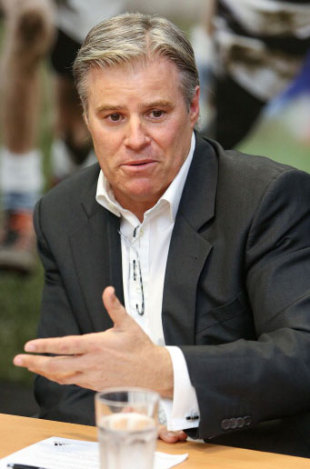|
International Rugby
IRB hint at greater say for emerging nations
Graham Jenkins
April 26, 2013

IRB chief executive Brett Gosper has recently visited New Zealand and Australia
© Getty Images
Enlarge
International Rugby Board (IRB) chief executive Brett Gosper has revealed that the sport's governing body are considering giving Italy and Argentina a greater say in the way the game is run.
IRB Council explained...
The IRB Council, ''the ultimate and supreme legislative authority of the IRB', is currently dominated by the 'foundation unions' - Scotland, Ireland, Wales, England, Australia, New Zealand, South Africa and France - who all have two representatives and therefore two votes on key issues such as proposed changes to the Laws of the Game, the hosting rights for the Rugby World Cup and the international tours schedule. But the extent of their traditional influence could be about to change if the IRB reward both Italy and Argentina for the growth they have overseen in their respective countries. "There is certainly debate in and around the Council that the new arrivals on the professional rugby stage who are contributing, not just in terms of their results on the field but also economically to the world game - and the most obvious ones are Italy and Argentina - should have as much say as the founding members who receive two places on the Council," Gosper told Rugby News magazine. "We'll see how that debate goes." However, Gosper stressed that despite the IRB's desire to develop the game around the world, it would not be fuelled by a promise of a say in how the game is run. "Given the economics of the IRB unions, I don't think there is any desire to move to a 'one federation, one vote' system. You can't, for instance, have Lithuania having the same clout at New Zealand or England - that's just not going to happen." Gosper, who succeeded Mike Miller as chief executive last year, also underlined the commercial factors behind the IRB's ambition to take the game into new territories and raise its profile where it is already established. "We're a bit like a corporation, so we like to go to the big markets where you can get growth which is good for the game in the medium and long-term future," he explained. "There is also interest to develop the game in markets where there is strong media, because that is going to give us more immediate financial return to put back into the game. We're seeing good growth in China, Brazil, India and Russia. There is also good growth in the United States, but it is more at grassroots level and the ability to transfer that growth to the top end of the game is not easy...we'd love to see that reach a point where it is translated into broadcast revenue." Gosper hinted at some concern at the profile of the game in Japan that will host the 2019 World Cup. "Japan has been a bit quieter on the growth-front in recent years," he said. "We've got some challenges with football and so on, but we are hoping the Rugby World Cup in 2019 will reactivate some of the interest. There is obviously a strong rugby culture in Japan, what with corporate and university competitions, but we again have to capture the imagination of these audiences. But he has been buoyed by the results seen elsewhere since he took office with the inclusion of Sevens at the 2016 Olympics in Rio set to fuel that growth further. "It's fascinating how markets you wouldn't associate with rugby have a huge interest in the sport. They love the values, excitement and history of the game so it's not a difficult see around the world. "It's a hard to think of a place on the planet where rugby is not growing in a healthy way. And the impetus provides by inclusion in the Olympics means that there two versions of the game which are both experiencing growth in new areas geographically." © ESPN Sports Media Ltd. Graham Jenkins is the Senior Editor of ESPNscrum and you can also follow him on Twitter.
|
Live Sports
Communication error please reload the page.
-
Football
-
Cricket
-
Rugby
-
- Days
- Hrs
- Mins
- Secs
F1 - Abu Dhabi GP
Abu Dhabi Grand Prix December 11-131. Max Verstappen ()
2. Valtteri Bottas (Mercedes)
3. Lewis Hamilton (Mercedes)
4. Alexander Albon ()
5. Lando Norris ()
6. Carlos Sainz Jr ()
-
ESPNOtherLive >>
Boxing - Nelson v Wilson; Simmons v Dickinson; Joshua v Gavern (Metro Radio Arena, Newcastle)
Golf - Houston Open
Snooker - China Open
Tennis - Miami Open

